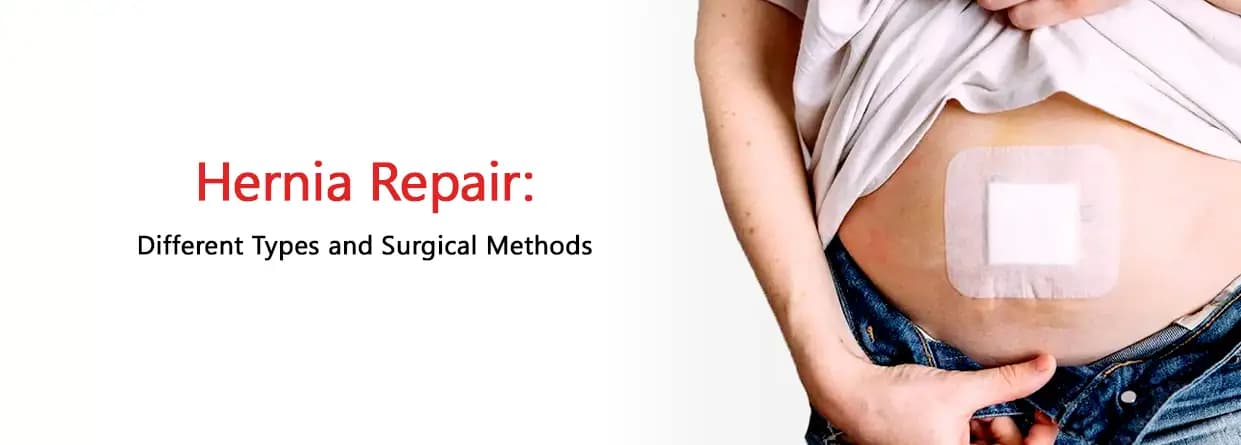
Hernia repair surgery is carried out for the treatment of hernias and to repair the affected organ or tissue position. A hernia is a result of an organ or tissue pushing through a weak area in the nearby muscle or connective tissue.
Hernia repair surgery is among the most common procedures that many people have to undergo to correct a hernia. It occurs when a muscle or connective tissue weak spot is penetrated by an organ or tissue. If you or someone you know has been advised to have hernia repair surgery, it is normal to feel nervous. If you are planning to undergo hernia repair surgery, book your appointment with one of the best general surgeons in Kolkata at CMRI to achieve desirable outcomes.
This blog offers you thorough information to make you feel at ease and knowledgeable about the procedure. Please note that this is research-based information and doesn’t replace the significance of a doctor’s consultation.
Hernia repair surgery is carried out for the treatment of hernias and to repair the affected organ or tissue position. A hernia is a result of an organ or tissue pushing through a weak area in the nearby muscle or connective tissue. Repositioning the dislodged tissue into its correct location and strengthening the weak spot to prevent it from happening again are the surgical procedures involved. The main aim of this surgical procedure is to alleviate pain, and discomfort, avoid complications and improve other symptoms.
Hernia repair surgery is categorized into two main types which are:
Your surgeon will examine you before the procedure to go over the details, including the kind of anaesthetic that will be used and any special instructions you may need to follow. This could include changing your medication, fasting window, or going through preoperative testing to make sure you are in good health for the procedure.
On the day of the procedure, you will be taken to the operating room and given anaesthesia to ensure your comfort and reduce pain. Whether your surgery is open or laparoscopic, it usually involves relocating the herniated tissue and using mesh or sutures to restore the muscle wall. Depending on how severe the hernia is, the timeframe of the treatment varies and typically lasts between thirty minutes and two hours.
You will be kept under observation in a recovery area following the procedure until the anaesthetic wears off. Most patients can return home the same day, while some might need to stay overnight for observation. Although recovery time might differ, most people can resume light activities in a few days and go back to their regular routines in a few weeks. It is crucial to follow post-instruction, such as how to take care of the surgical site, control pain, and gradually resume activities given by your surgeon.
After the procedure, some soreness and swelling are common, but these side effects should eventually go away. You must ensure visiting for follow-up sessions so that they can track your healing process and address any issues.
Hernia repair surgery is an efficient and secure procedure to treat hernias, ease pain, and avoid complications. Undergoing surgery can seem frightening, but being ready can help reduce anxiety. Remember that your healthcare team is available to assist you at every stage. You should talk to your healthcare provider if you experience any complications after the surgery. A quicker recovery and a more comfortable, healthy life are in store if you receive the right treatment and direction.
While non-surgical interventions such as truss wear, cautious waiting, or lifestyle modifications may provide short-term symptom relief, they do not address the underlying cause. Usually, surgery is required to avoid problems in future.
Most hernia repair procedures are less invasive and are often regarded as routine surgeries. It is a major procedure as it has certain risks and needs recovery time, just like any other surgery.
Written and Verified by:
-Dr.-P.-K-Nimani-(General-Surgery-).webp&w=256&q=75)
Dr. Pradeep Kumar Nemani is a Consultant General and Breast Surgeon at CMRI, Kolkata, with over 34 years of experience. He specializes in appendectomy, hernia repair, gallbladder surgery, and complex abdominal procedures.
© 2024 CMRI Kolkata. All Rights Reserved.